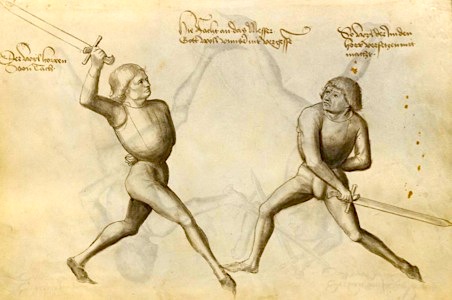Our entourage has been milling about Shropshire for quite some time now, and has developed a reputation within its borders. This seems to have come as a surprise to at least one player, though, and so I'd like to make a brief excursion into the way in which information travelled in the Middle Ages.
It's difficult for us to imagine life without the Internet, without television or radio, without printed media, when just about the only source of information to which anyone had access was human conversation. With people spending most of their lives in only one town, village, or hamlet, how on earth could anyone learn about anything happening as far away as the next shire?
The perhaps surprising answer is: Remarkably well.
As I’ve mentioned a few times before, within any medieval man's given locality, he is known, to some degree, by just about everyone. Even in a large town, it's highly probable that nearly all of the residents would know each other by sight, as such residents comprised nearly all of one's human acquaintance for nearly all of one's life. At the very least, the guards at the city gate would be well enough acquainted with the denizens within its walls that they would know who charge entry tolls and who should and should not be going in or out. This, after all, is their job. Trying to masquerade as a resident to escape the toll simply isn't an option.
As I’ve mentioned a few times before, within any medieval man's given locality, he is known, to some degree, by just about everyone. Even in a large town, it's highly probable that nearly all of the residents would know each other by sight, as such residents comprised nearly all of one's human acquaintance for nearly all of one's life. At the very least, the guards at the city gate would be well enough acquainted with the denizens within its walls that they would know who charge entry tolls and who should and should not be going in or out. This, after all, is their job. Trying to masquerade as a resident to escape the toll simply isn't an option.
In turn, each person's connections would extend well beyond his place of residence. He might have relatives in several other municipalities, some of them perhaps hundreds of miles away. Aside from the letters that the literate would exchange, there is an intricate and highly-developed gossip network in place.
People simply spent a lot of time talking. There would be ample time to talk at the market, while getting water at the town well, when passing in the road in the midst of errands, over the merchandise bought and sold at the city stall, and over food and drink at the ale house. New information was exchanged with eager relish, just as it is today; only, with so much less of it to go around, medieval people tended to do quite a bit more with what they had.
At supper, families would have plenty of time to share all they’d learnt during the day, and this in turn would be passed on to each of their contacts the next day. If they left their village for the parish church, they would carry information there and bring news back. Likewise if they went even further, such as to town on a market day; and travellers on the roads between towns would eagerly share what they’d heard through the grapevine as well as significant announcements from the town crier. With sufficient time to talk, theories and opinions would be developed and exchanged, and lots and lots of detail would be included.
Since people encountered so many fewer strangers than they do now, they would be acutely attuned to differences in facial features, dress, and mannerisms, and would be able to describe these to the people they knew. It’s not hard to see how the party, on entering a town for the first time, might be recognised by people who had merely heard of them.It wouldn’t take long for word to spread to everyone who cares. It would be extremely hard to keep a low profile in all but the largest towns.
It’s even harder, perhaps, for people accustomed to focusing on their smartphones, and ignoring their surroundings, to place themselves in a world where paying attention is one’s only guide to knowledge. As the campaign world’s filter, the DM is the only source of that information.
I’m talking, obviously, about adventure hooks.
The entourage is about to embark on a hundred-mile journey, and perhaps go town-hopping along the way. This is splendid. They may very well end up in an adventure or more; it all depends on what they do with the information they’re given. Or perhaps I should say: The information they proactively collect.
As DM, I'm not going to be able to make too much happen to them. For one thing, now that this group is ten well-armed and, in a few cases, dangerous-looking people, who will almost certainly all be on horseback by the time they leave the shire, bands of thieves are unlikely to bother them on the road. So that pretty much omits the DM force-feeding any action of that type.
They’ll have to talk to people, whether at the inns where they stay, the churches where they mingle, or to people into whom they bump on the street. They'll have to listen, whether to the town crier, to snippets of conversation overheard or misheard, or to things told directly to them, which could be the first clue toward incredible intrigue, or could be worth nothing.
Or they could ignore everything but the road in front of them, and have a right boring trip.





